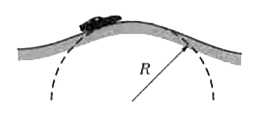A roller coaster is designed such that riders experience "weightlessness" as they go round the top of a hill whose radius of curvature is . The speed of the car at the top of the hill is between
14 m/s and 15 m/s
15 m/s and 16 m/s
16m/s and 17m/s
13 m/s and 14m/s
The correct Answer is:A
Balancing the forces, we get

For weightlessness, N=0
where R is the radius of curvature and v is the speed of car.
Therefore,
Putting the values, R=20, g=
So,
Thus, the speed the car at the top of the hill is between 14 m/s and 15 m/s.
Note : The roller coaster is a popular amusement ride developed for amusement parks and modern theme parks.
Topper's Solved these Questions
Similar Questions
A roller coaster car has mass of 1300 kg when fully loaded with passengers. As the car passes over the top of a circular hil of radius 20m, its speed is not changing. At the top of the hill, what are the (a) magnitude FN and (b) direction (up or down) of the normal force on the car from the track if the car's speed is v=11m/s? What are (C) FN and (d) the direction if v=14m/s?
View SolutionTwo guns situated at the top of a hill of height 10m fire one shot each with the same speed 5√3m/s at some interval of time. One gun fires horizontal and the other fores upwards at an angle of 60∘ with the horizontal. Two shots collide in air at a poit P. Find (i) time-interval between the firing and (ii) coordinates of the point P. Take the origin of coordinates system at the foot of the hill right below the muzzle and trajectorise in the x−y plane.
View Solution
Knowledge Check
A Roller coaster is desigend such that riders experience "Weightlessness " as they go round the top of a hill whose radius of curvature is 20 m. The speed of the car at the top of the hill is between
A15m/sand16m/sB16m/sand17m/sC13m/sand14m/sD14m/sand15m/sA block of mass m at the end of a string is whirled round in a vertical circle of radius R. The critical speed of the block at the top of its swing below which the string would slacken before the block reaches the top is
ARgB(Rg)2CRgD√Rg
A train with a length of L=1050m moves uniformly on the horizontal section of rail road.However the train encounters a small hill that slopes gently.With what minimum speed v (in m/s ) can the train cross the hill? The base of hill has a length l=100m the lengths of the slope are l_(1)=80m and l_(2)=60m .The slope of hills can be consider as straight lines and the small section of rounding at the top of the hill can be ignored.Neglect air drag.(take g=10m/s^(2) ).
View SolutionA car moves at a constant speed on a straigh but hilly road. One section has a crest and dip of the 250m radius.
(a) As the car passes over the crest the normal force on the car is half the 16kN weight of the car. What will the noraml force on the car its passes through th ebottom of the dip?
(b) What is the greatest speed at which the car can move without leaving the road at the top of the hill ?
(c) Moving at a speed found in part (b) what will be the normal force on the car as it moves through the bottom of the dip? (Take, g=10m/s2)
View SolutionA particle is thrown horizontally from the top of a tall tower with a speed of 10m/s. if radius of curvature of path followed is 4√2k m at t=1sec, then find the value of k.
View SolutionLargely because of riding in cars, you are used to horizontal circular motion. Vertical circular motion would be a novelty. In this sample problem, such motion seems to defy the gravitational force.
In a 1901 circus performance, Allo Dare Devil Diavolo introduced the stunt of riding a bicycle in a loop the loop. Assuming that the loop is a circle with radius R=2.7m, what is the least speed v that Diavolo and hisbicycle could have at the top of the loop to remain in contact with it there?
View SolutionTwo guns situated at the top of a hill of height 10m fire one shot each with the same speed 5√3m/s at some interval of time. One gun fires horizontal and the other fores upwards at an angle of 60∘ with the horizontal. Two shots collide in air at a poit P. Find (i) time-interval between the firing and (ii) coordinates of the point P. Take the origin of coordinates system at the foot of the hill right below the muzzle and trajectorise in the x−y plane.
View SolutionIn fig a stuntman drives a car (without negative lift) over the top of a hill, the cross section of a hill, the cross section of which can be approximated by a circle of radius R=250 m. What is the greatest speed at which he can drive without the car leaving the road at the top of the hill?

View Solution
